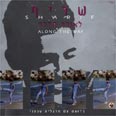
Palestinians block Israeli Druze singer's gig
Sharif forced to cancel New Year's Eve show in West Bank because of threats to his life from activists opposing coexistence with Jewish state. 'I'm a man of peace, not politics,' he says
It was the latest in a string of cancellations after threats and other pressure tactics by Palestinians groups promoting a boycott of virtually anything connected with Israel.
The boycott movement says its tactics are a nonviolent way to protest Israeli policies. Israeli officials denounce the efforts as "delegitimization" of Israel's right to exist.
Sharif, who uses only one name, said he was expecting to perform before thousands of Palestinian fans at a New Year's Eve concert in Ramallah, the West Bank administrative capital, but he was told the day before that his concert was being canceled because of a threat to his life.
"I'm an artist and I want to sing before all audiences," said Sharif, a member of Israel's Arab Druze minority who sees himself as a bridge between the two sides. "I'm a man of peace, not politics. I just want to bring my music to my fans."
Palestinian activists campaigned against his concert because he has performed before Israeli soldiers.

Posters announcing Sharif's show in Ramallah
Palestinian police said the decision to cancel the show was based purely on security concerns. They said once they became aware of the opposition, which was organized in a Facebook campaign, they ordered the concert canceled.
"When we see people bracing to bar a controversial party like this, we interfere to prevent any tension or violence," said Adnan Damari, a police spokesman.
Sharif said he separates his performances from politics, noting he has played in the West Bank and Gaza before and dreams of performing in Syria and Lebanon.
"I'm surprised that this was done against me - I belong to both sides," said Sharif, 32, who performed earlier last year in the West Bank. "I've got to get back there and I hope it happens soon." The Druze sect is part of the larger Israeli-Arab minority.
It wasn't the only controversy in Ramallah on New Year's Eve.
Palestinian singer Basel Zayed was prevented from completing his concert after he performed a song that mocked the Palestinian leadership. Under pressure from Palestinian police, organizers shut down the event.
'Activists promoting hatred against Israel'
The New Year's incidents follow two other events in which Israeli-Palestinian dialogue meetings were thwarted because of Palestinian pressure. The activists behind the move oppose any "normalization" between Palestinians and Israelis as long as peace talks between the sides are deadlocked. Negotiators sat down in Jordan Tuesday for their first meeting in 15 months.
"The movement in Jerusalem will always demonstrate against any joint meeting as long as the peace process is stalling," said Hatem Abdel Qader, an adviser to Palestinian President Mahmoud Abbas on Jerusalem affairs.
Palestinian government spokesman Ghassan Khatib said the meetings were local initiatives – his government was not involved and did not oppose them. Even so, among the Palestinians who objected to the Israeli-Palestinian meeting were senior members of Abbas' Fatah movement.
Palestinian activists have long called for boycotts of Israel, hoping such pressure will achieve what years of negotiations and violent uprisings have not: end Israel's occupation of the West Bank and east Jerusalem and bring about creation of a Palestinian state.
In recent years, the Palestinians have scored several small victories, persuading some European pension funds to divest themselves of firms involved in West Bank settlement construction, for example. Several international artists, including Elvis Costello and the Pixies, have canceled performances in Israel to protest Israeli policies.
Another band, Boney M, was ordered by Palestinian concert organizers not to sing its hit "Rivers of Babylon," which quotes a biblical passage referring to the Jewish people's yearning to return to the biblical land of Israel.
Israel says the economic impact of the boycott campaign has been negligible and accused the activists of promoting hatred against the Jewish state.
Yossi Kuperwasser, the director-general of Israel's Strategic Affairs Ministry, said "anything happening to promote peace," such as musical performances or academic conferences, "should be accepted by the Palestinians." Instead, he said the cancellation of such events reflects a campaign by the Palestinians to delegitimize Israel.
"They don't accept Israel as a Jewish state as a fact, let alone its right to exist," said Kuperwasser, whose office monitors what it says is incessant incitement against Israel in Palestinian society.










